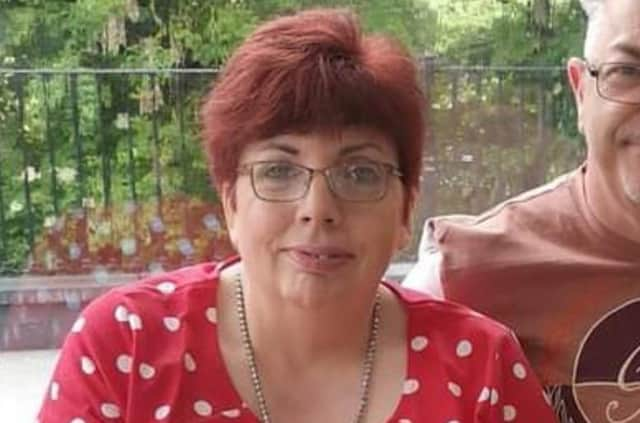Co Tyrone woman with rare blood cancer encourages others to be aware of leukaemia symptoms


“My symptoms started with migraines, a first for me,” said Jayne.
“These were terrifying as the sight loss comes first. I then kept getting recurring chest infections, despite having antibiotics and chest x-rays, and felt fatigued, which I put down to working full-time. Thankfully, I had a very good GP who had noticed that with every blood test I had over a period of years my platelet count was continually rising, so he said he would refer me to haematology to see what they thought. The funny thing was my GP said, ‘They might not even want to see you, and might just recommend going on to aspirin’.”
Advertisement
Hide AdAdvertisement
Hide AdJayne said she had her first appointment quite quickly, and didn’t expect to hear “anything worrying”.
“But then the consultant delivered the results. He said, ‘Well, you have tested positive for the JAK2 mutation in your bone marrow, which means you have essential thrombocythaemia (ET)’.
“I looked round at my husband, who reached across and put his hand in my knee, and I could see the shock in his face. I asked what this meant, and to be fair he described the condition to me very well and in such a way that we could understand.
“My husband and I came away from that appointment in a trance. We talked and I made a few decisions about who and how I was going to tell. My daughter and her husband had been through IVF successfully and had a wee boy, our first grandchild, only a week before, so I decided I wouldn’t tell them as I didn’t want to burst that bubble of happiness with my news. Then because I hadn’t told my daughter, I didn’t feel it was right to tell my son, who lives at home. So, I only told my sister and my work.
Advertisement
Hide AdAdvertisement
Hide Ad“I can remember even when saying it out loud I felt like I was talking about someone else. Obviously, this was a coping mechanism but I didn’t realise that at the time. I have a very bad family history: my mum died at 56 with breast cancer, when I was 16; my dad died at 65 with bladder cancer, when I was 20; my brother died at 49 with leukaemia and I had a sister who died at 17 with cardiomyopathy, when I was seven, so my poor sister was having to go through yet another family diagnosis.”
From her diagnosis, Jayne was seen every three months at haematology and took aspirin.
“I was what they call ‘watch and wait’. They extended the time between appointments to four months, and all was stable. I still got headaches, not so many migraines thankfully, had fatigue but managed all these and kept going.
“Then COVID-19 hit, and my appointments were changed to telephone ones, which was fine. In April 2020 I was furloughed from my job, which I was happy with as I had felt vulnerable in work.”
Advertisement
Hide AdAdvertisement
Hide AdDuring a telephone appointment in May 2021, Jayne was told she had developed another myeloproliferative neoplasm (MPN) called polycythaemia vera, which she said was a “complete shock”.
“Now I’m being seen three-monthly again. I have now also had to start taking cholesterol tablets and blood pressure tablets to help reduce my risk of stroke or heart attack. With everything I have going on, my anxiety was on overdrive and I was very down, so I’m also taking Sertraline (an antidepressant) to help with that. I’ve always said with these types of illnesses people assume you’re OK because you’ve showered, washed your hair, painted on a smile but no one, except the people closest to you, see the effort it has taken to do that or see the fatigue, the headaches, the down times.”
Jayne is sharing her experience as a new poll has found only one in 100 people are aware of leukaemia symptoms.
The main signs of the cancer of the white blood cells are fatigue, bruising, unusual bleeding and repeated infections.
Advertisement
Hide AdAdvertisement
Hide AdBut a new poll for the charities Leukaemia UK and Leukaemia Care found that just two per cent of people in Northern Ireland were able to identify all four of the main symptoms. The charities have launched a new campaign to raise awareness of symptoms ahead of Blood Cancer Awareness Month in September.
As well as the main symptoms of the disease, the campaign also points out some of the lesser-known symptoms including fever or night sweats, bone or joint pain and swollen lymph nodes. They urged anyone concerned about symptoms to contact their GP.
Fiona Hazell, chief executive of Leukaemia UK, said: “People underestimate their risk by thinking that leukaemia is a childhood disease.
“In reality, both incidence and mortality rates rise sharply after the age of 55.”
For more information visit: www.spotleukaemia.org.uk
Comment Guidelines
National World encourages reader discussion on our stories. User feedback, insights and back-and-forth exchanges add a rich layer of context to reporting. Please review our Community Guidelines before commenting.